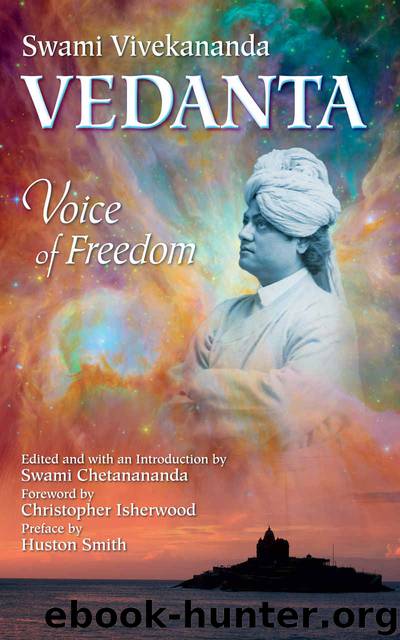Vedanta: Voice of Freedom by Swami Vivekananada

Author:Swami Vivekananada [Vivekananada, Swami]
Language: eng
Format: azw3
Tags: Religion, Biography, Hinduism
Publisher: Vedanta Soicety of St. Louis
Published: 2017-04-03T04:00:00+00:00
What Is the Atman?
There is a great discussion going on as to whether the aggregate of materials we call the body is the cause of the manifestation of the force we call the soul, thought, etc., or whether it is thought that manifests this body. The religions of the world, of course, hold that the force called thought manifests the body, and not the reverse. There are schools of modern thought which hold that what we call thought is simply the outcome of the adjustment of the parts of the machine that we call the body. The second position — that the soul, or the mass of thought, or whatever you may call it, is the outcome of this machine, the outcome of the chemical and physical combinations of matter making up the body and brain — leaves the question unanswered. What makes the body? What force combines the molecules into the body form? What force is there that takes up material from the mass of matter around and forms my body one way, another body another way, and so on? What makes these infinite distinctions? To say that the force called the soul is the outcome of the combinations of the molecules of the body is putting the cart before the horse. How did the combinations come? Where was the force to make them? If you say that some other force was the cause of these combinations, and the soul was the outcome of that matter, and that soul, which combined a certain mass of matter, was itself the result of the combinations — it is no answer. That theory ought to be accepted which explains most of the facts, if not all, and that without contradicting other existing theories. It is more logical to say that the force that takes up the matter and forms the body is the same [as that] which manifests through that body.
To say, therefore, that the thought-forces manifested by the body are the outcome of the arrangement of molecules and have no independent existence has no meaning. Neither can force evolve out of matter. Rather it is possible to demonstrate that what we call matter does not exist at all. It is only a certain state of force. Solidity, hardness, or any other state of matter can be proved to be the result of motion. Increase of vortex motion imparted to fluids gives them the force of solids. A mass of air in vortex motion, as in a tornado, becomes solid-like and by its impact breaks or cuts through solids. A thread of a spider’s web, if it could be moved at almost infinite velocity, would be as strong as an iron chain and would cut through an oak tree. Looking at it in this way, it would be easier to prove that what we call matter does not exist. But the other way cannot be proved.
What is the force that manifests itself through the body? It is obvious to all of us,
Download
This site does not store any files on its server. We only index and link to content provided by other sites. Please contact the content providers to delete copyright contents if any and email us, we'll remove relevant links or contents immediately.
Fingersmith by Sarah Waters(2531)
Kundalini by Gopi Krishna(2180)
Wheels of Life by Anodea Judith(2144)
Indian Mythology by Devdutt Pattanaik(1936)
The Bhagavad Gita by Bibek Debroy(1925)
The Yoga of Jesus: Understanding the Hidden Teachings of the Gospels by Paramahansa Yogananda(1847)
Autobiography of a Yogi (Complete Edition) by Yogananda Paramahansa(1823)
The Man from the Egg by Sudha Murty(1805)
The Book of Secrets: 112 Meditations to Discover the Mystery Within by Osho(1658)
Chakra Mantra Magick by Kadmon Baal(1638)
The Sparsholt Affair by Alan Hollinghurst(1585)
Sparks of Divinity by B. K. S. Iyengar(1530)
Gandhi by Ramachandra Guha(1528)
Avatar of Night by Tal Brooke(1519)
Karma-Yoga and Bhakti-Yoga by Swami Vivekananda(1488)
The Bhagavad Gita (Classics of Indian Spirituality) by Eknath Easwaran(1477)
The Spiritual Teaching of Ramana Maharshi by Ramana Maharshi(1426)
Hindoo Holiday by J. R. Ackerley(1374)
Hinduism: A Very Short Introduction (Very Short Introductions) by Knott Kim(1372)
